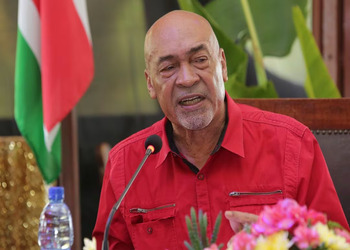Suriname’s highest court scored a win for rule of law by upholding a murder conviction against former dictator and President Desi Bouterse, but the ruling may do little to uproot a system of criminal patronage pioneered by the former head of state.
High court magistrates on December 20 upheld a 20-year prison sentence against Bouterse, who as Suriname’s military dictator oversaw a series of assassinations against 15 government dissidents in December 1982.
The 78-year-old Bouterse was the main suspect in the case, which first went to trial in 2007. After many delays and two appealed convictions in 2019 and 2021, the December 20 verdict is final.
The judges did not order Bouterse’s arrest when upholding the conviction, but the Public Prosecutor’s Office said it would execute the ruling.
Bouterse did not attend the hearing and his current whereabouts are unknown. His lawyer, Irvan Kanhai, told journalists he was disappointed by the court’s decision.
Though the high court’s decision is final, Bouterse may not serve time in prison. His lawyer has requested a temporary suspension of the prison sentence, as he wants to submit a request for a presidential pardon. However, President Chandrikapersad Santokhi told Dutch media Nieuwsuur that “there is a verdict, and that verdict must be carried out.”
Bouterse could also file a complaint to the Inter-American Court of Human Rights, according to Gerold Sewcharan, lawyer and chair of the Foundation for the Rule of Law in Suriname.
SEE ALSO: Corruption, Cocaine, and Gold: Interview With Suriname’s President Santokhi
Bouterse, Suriname’s military dictator from 1980 to 1987 and elected president from 2010 to 2020, is one of the country’s most influential figures. He repeatedly tried to obstruct the case against him, including by amending the country’s amnesty law in 2012. The amendment halted the case until 2015.
In a political career spanning four decades, Bouterse has been repeatedly linked to drug trafficking by foreign law enforcement, diplomats, and the media. In 1999, a Dutch court sentenced him in absentia for trafficking almost 500 kilograms of cocaine.
Bouterse is the leader of Suriname’s main opposition party, the National Democratic Party (Nationaal Democratische Partij – NDP). He has described the case against him as politically motivated.
InSight Crime Analysis
The verdict against Bouterse shows that no one in Suriname is above the law.
“It shows that democracy has been preserved and that we have a functioning rule of law,” Glenn Truideman, a Surinamese political scientist, told InSight Crime.
But the ruling is unlikely to dislodge a criminal system spearheaded by the former president, in which some high-level politicians provide cover and support to drug traffickers. Suriname’s judiciary, lacking sufficient human resources, will continue to grapple with systemic corruption and drug trafficking that has long plagued the country’s government.
“It is improving, but there are not enough judges, not enough supporting personnel,” Sewcharan said.
For decades, Bouterse and others used their clout in government to facilitate drug trafficking through Suriname.
Bouterse’s second-in-command was convicted of trafficking drugs in 1986. A co-conspirator in that case told undercover US agents the then-president could offer protection for drug shipments through Suriname.
“The entire military revolved around cocaine, as did politics and business,” Marcel Nelom, who was Bouterse’s security agent for ten years, told Dutch news magazine De Groene Amsterdammer in 1994.
Bouterse was frequently linked to the drug trade after Suriname transitioned to democracy in 1987. The former dictator set up arms-for-cocaine deals with the Revolutionary Armed Forces of Colombia (Fuerzas Armadas Revolucionarios de Colombia – FARC), according to a Brazilian parliamentary inquiry from the 1990s. He also allegedly partnered with neighboring Guyana’s most prominent drug trafficker in the early 2000s.
None of this stopped Bouterse from becoming Suriname’s president twice, in 2010 and 2015.
In 2012, Dutch police wiretapped a conversation in which drug traffickers appeared to refer to Bouterse by a nickname, “Bouta.” In the conversation, the traffickers said “Bouta” and an accomplice called “Dino” – the name of Bouterse’s son – could salvage a load of cocaine from a plane stranded in Suriname’s jungle. Dino Bouterse was convicted on drug trafficking and other charges in the United States in 2015.
After his presidency ended in 2020, Bouterse remained in the drug trade, according to a hacked email from Colombia’s Attorney General’s Office, accessed during an InSight Crime investigation. In 2022, an informant told a Colombian state investigator that Bouterse was part of a network that was planning to send between 1.2 and 1.5 tons of cocaine through Suriname in a private plane. However, other sources consulted by InSight Crime indicated Bouterse had retired from the drug trade.
Other high-level politicians have also abused their authority to profit from the drug trade without facing consequences in Suriname.
Current Vice President Ronnie Brunswijk was convicted for drug trafficking in the Netherlands in 1999 and in France in 2000. In August 2020, a US Drug Enforcement Administration (DEA) special agent told the Colombian Attorney General’s Office he suspected Brunswijk was involved in a case in which 400 kilograms of cocaine were returned to a trafficker after being seized, according to hacked emails accessed in the same InSight Crime investigation.
Brunswijk has denied any involvement in drug trafficking.
SEE ALSO: Europe’s Weakest Border? Smuggling Between Suriname and French Guiana
In 2019, a French court convicted Joël Martinus – a board member of Brunswijk’s political party – in absentia for running a drug trafficking ring that exported cocaine from Suriname to France. The following year, Suriname’s board of ministers approved his appointment as a government policy advisor.
The conviction of Desi Bouterse, who many believed to be untouchable, has brought hope that more politicians involved in the drug trade may be held to account.
“We are moving towards a situation where everyone is equal before the law,” Sewcharan said.

